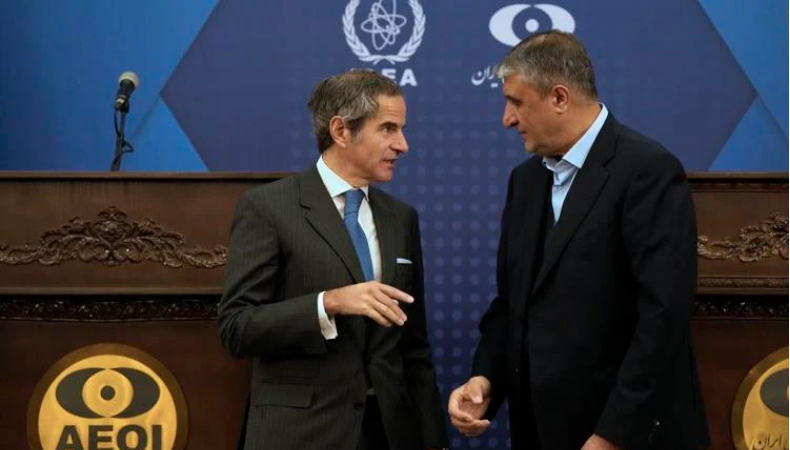Diplomacy at Risk: IAEA Chief Warns Time Is Running Out to Resolve Iran’s Nuclear Crisis

Concerned about the mounting tensions over Iran’s nuclear program, the president of the International Atomic Energy Agency (IAEA) has issued a grim warning stressing the limited “space for negotiation and diplomacy”. This concerning warning comes as regional crises in the Middle East get more intense and former President Donald Trump gets ready for a possible comeback to the White House, a situation that would drastically change U.S. policy towards Iran. Currently in Tehran on a mission to restore inspection access to Iran’s nuclear facilities and address the growing worries over the nation’s expanding atomic program, Rafael Mariano Grossi, the director-general of the IAEA.
Limiting Diplomatic Space
The remarks made by Grossi fit a diplomatic terrain growing more challenging. Although his visit was meant to close gaps and restart cooperation between the IAEA and Iran, the agency’s capacity to settle current issues seems to be declining. Since the United States unilaterally withdrew from the 2015 nuclear agreement, technically known as the Joint Comprehensive Plan of Action (JCPOA), the IAEA, a major organization charged with guaranteeing nuclear non-proliferation, has encountered recurrent challenges.
Iran has progressively removed the restrictions of the accord since the U.S. departure, increasing its nuclear program including enrichment of uranium to levels near to weapon-grade purity—just shy of the 90% threshold required for atomic weapons. As political tensions increase and global uncertainty intensifies, Grossi’s travel to Tehran represents yet another effort to reduce the rising risks of more escalation.
Iran’s nuclear behavior changed noticeably when the JCPOA broke down in 2018. Tehran has increased its uranium enrichment, beyond the bounds of international tolerance as there are now no official restrictions on its nuclear operations. The IAEA has responded by trying to keep access to important locations and tools while cameras monitoring Iran’s nuclear program are often switched off or obstructed.
Grossi’s attempts to reestablish the agency’s capacity to keep an eye on Iran’s facilities have mostly failed, which begs major concerns about whether the nation is really headed toward nuclear weapon development or if its nuclear ambitions are just benign as it says. The most recent remarks of the IAEA chief highlight the significance of these talks as the continuous Israel-Hamas conflict aggravates regional tensions and growing animosities between Iran and Israel complicate diplomatic efforts.
Iran’s Rising Defiance
Iran, on the other hand, has demonstrated little openness toward concessions. Tehran’s government has warned time and again that it would renounce the Treaty on the Non-Proliferation of Nuclear Weapons (NPT), therefore endorsing the quest for nuclear weapons. Head of Iran’s Atomic Energy Organization Mohammad Eslami made clear during his press conference with Grossi that any resolution voted at the forthcoming Board of Governors meeting aiming at Iran’s nuclear activity would result in “immediate reciprocal steps.” This comment captures Iran’s firm attitude, one that has progressively turned away outside pressure and intervention in respect to its sovereign nuclear aspirations.
Foreign Minister Abbas Araghchi, who responded on social media to underline that Iran would not be coerced into negotiations under what it judged “pressure and intimidation,” reflected Eslami’s words. These remarks highlight the difficulty in reaching a diplomatic solution, particularly in cases when one of the main participants is not ready to submit to outside demands.
Privacy Issues and the Correct Course Ahead
Privacy and surveillance present one of the main challenges in the diplomatic process. As Iran keeps pushing back on international inspection, correct age and identity verification complicates the IAEA’s inspection activities. Currently erratic age estimation technology and ideas for digital identity could set the ground for contentious privacy policies. Critics, notably online specialist Tama Leaver, have expressed worries about major privacy violations resulting from assigning the obligation for identification verification to the Iranian government or social networking sites.
Although Grossi has voiced hope that a diplomatic breakthrough is still feasible, detractors worry that the way sensitive information is handled and that monitoring policies could cause fresh strife. In a digital age when people’s data is sometimes misused, privacy issues are particularly sensitive and hence the application of such restrictions could be more detrimental than beneficial.
The road forward is still rather murky while Grossi and Iranian officials negotiate. The conflicts surrounding Iran’s nuclear program go beyond nuclear weapons; they are a part of a larger geopolitical fight in the Middle East involving regional states, world superpowers, and non-state entities. Given the likelihood of more escalation, the requirement of a thorough, international answer has never been more important. Still, time is not on the side of diplomacy as Grossi’s visit emphasizes. The probability of a more major conflict rises as the area for negotiations shrinks, therefore compromising world security.
The world will monitor attentively in the next months while the IAEA and Iran’s leadership negotiate this unstable scenario. Not only for the direction of Iran’s nuclear aspirations but also for regional stability and international relations, the stakes are great. Whether Grossi’s positive view is accurate or if the diplomatic window closes totally, resulting in more extreme actions in the search of settlement, remains to be seen.




